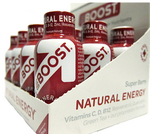
Here, Josh Taekmann (JT) co-founder of the EBOOST brand, also chats to BeverageDaily.com about the future for energy drinks as a category, and catering for rising Baby Boomer demand.
Marketing guru Takemann saw a hole in the energy supplement industry, and developed EBOOST (pictured) as an all-natural drink with vitamins C, D, B12, B6, resveratrol and natural caffeine from green tea.
BD: Do younger energy drink consumers necessarily want ‘safe’ products – given the necessary attraction of energy drinks with ‘bad’ ingredients and edgy marketing used to sell them?
JT: “I do think there is a large base of consumers who just want energy, and are not focused on the supplement facts or safety of the product, unfortunately.”
BD: Your product, EBOOST is formulated as a healthy alternative to traditional energy drinks, but will consumers really buy this?
JT: “What we see is a new level of awareness and consciousness of what’s inside, with consumers more dialed into what ingredients are considered good and healthy, and what ingredients they want to stay away from.
“[This is the case] whether consumers are opting-out of sucralose and opting for stevia or natural sweeteners, or upgrading from straight caffeine to naturally occurring caffeine from green tea.”
Senator Durban pokes hornet’s nest…
BD: Obviously, the US Food and Drug Administration (FDA) dismissed Senator Durban’s caffeine concerns, but there is no doubt that the industry is under pressure.
What can industry do to ease pressure from politicians, campaign and healthy groups, in order to address their concerns? Obviously, too much regulation and negative press (for instance, Monster and PepsiCo's recent subpoenas sent by the New York attorney general ) is bad for business...
JT: “We all know there are clinical studies supporting the benefits of caffeine, but some major players in the energy category need to take a leadership position in educating consumers (particularly younger consumers) about the benefits of caffeine.
“But also educate them on being responsible, because there is a limit to the amount of caffeine they should take.
“They [the major players] need to list amounts of caffeine in products, and also possible side effects of other known ingredients that may stimulate energy but also potentially have side effects, whether it be taurine or guarana.”
“I think there needs to be more transparency from the energy companies on the ingredients, amounts of caffeine, benefits, but also potential side effects of their ingredients.”
Future energy trends
BD: How big a worry is heavyweight political involvement in the energy drinks industry?
JT: “Anytime you have government coming in and making decisions for your category is a concern and issue for the entire industry. The benefit we see is that it will identify the companies and practices they deem questionable.
“We are conscious of the government’s issues, and hopefully EBOOST will be recognized as a company that is doing things right. That’s where the market should be.”
BD: What does the future hold in terms of energy drink flavors, packaging, sales demographics?
JT: “The future is going to be about real functional benefits, flavor innovation, efficacy and creating products that meet the needs of each demographic, because there is huge growth coming from the Baby Boomers, who have different functional demands than young adults.”





